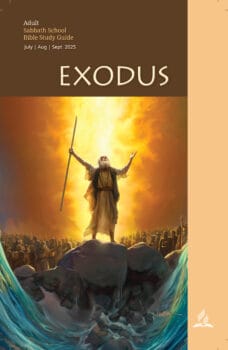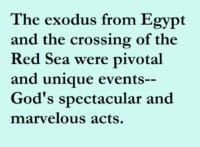Introduction: Exodus – Journey to the Promised Land
The God revealed in the book of Exodus is the loving Lord who at the appointed time—and with His mighty actions—brought salvation and deliverance to His people (Gen. 15:12–16). The Exodus from Egypt and the crossing of the Red Sea were pivotal and unique events—God’s spectacular and marvelous acts.
No greater or more glorious event ever happened in the history of ancient Israel before the Cross. It is the gospel, but according to Moses.
God miraculously and repeatedly arose to demonstrate His care and protection for the Hebrews, despite their constant backslidings. His mercy surpassed all their understandings and feelings. With His outstretched arm, the Lord led His people to freedom. It was an unprecedented act. This unexpected series of divine interventions was the beginning of their renewed journey with God, a journey from Egypt to (eventually) Canaan.
Though Moses plays an important role in Exodus, this book is not about Moses but about God—the God of love, truth, justice, freedom, and forgiveness, the God who ultimately went to the cross for us. By studying Exodus, we get a unique look at what our God is really like.
And what is He really like? He is a God who was faithful to His people despite their unfaithfulness. He was constantly for them, even when they were against Him. Again and again, He showed them His mercy, bringing encouragement, correction, and divine instruction. Leading them in the best possible way, He wanted them voluntarily, out of love for Him and His character, to worship and obey, all for their own good.
The God of Moses is the God of relationships. The most important objective of God was not to accomplish something or to fulfill an agenda; instead, His prime objective was to create a meaningful relationship with His chosen people, Israel. He led them to Sinai in order to establish this deep fellowship.
The apostle Paul teaches that what happened to God’s people in the past is an object lesson for us so that we could learn from their mistakes and faithfully follow the Lord today: “Now these things happened to them as an example, but they were written down for our instruction, on whom the end of the ages has come” (1 Cor. 10:11, ESV). These past events should be a warning and a source of unforgettable instruction for us now. We should read them, study them, and learn from them, because no matter how different the circumstances, the spiritual principles behind them remain the same.
Our plan for studying the book of Exodus during these 13 weeks is transparent. The book is divided into weekly chapter readings of various lengths (divided thematically for convenience): (1) Slavery in Egypt, the birth of Moses, and his first 40 years (Exodus 1–2). (2) Commission of Moses (Exodus 3–4). (3) Complications: when life becomes worse (Exodus 5–6). (4) The first nine plagues (Exodus 7–10). (5) The tenth plague and the celebration of the Passover (Exodus 11–12). (6) The liberation from Egypt, and the Red Sea experience (Exodus 13–15). (7) The journey to Mount Sinai (Exodus 16–18). (8) The gift of God’s Covenant and the Decalogue (Exodus 19–20). (9) God’s law applied (Exodus 21–23). (10) The Covenant confirmed and the blueprint of the tabernacle (Exodus 24–31). (11) The golden calf apostasy and Moses’ intercession (Exodus 32). (12) God’s self-revelation and the radiant face of Moses (Exodus 33–34). (13) The tabernacle built and dedicated (Exodus 35–40). Each week we focus on key passages and events from indicated chapters.
May our gracious Lord bless us as we study this pivotal book that reminds us of how God wants to lead His people from slavery to freedom, from death to life, and from the wilderness to the New Jerusalem (Heb. 12:22).
Jiří Moskala is professor of Old Testament exegesis and theology, and dean of the Seventh-day Adventist Theological Seminary at Andrews University.



Exodus is a story about a persistent God hammering away at a population of seminomadic, cantankerous, rebellious, stiff-necked people, trying to instil the idea of serving a loving God and living a fruitful and unselfish life together with one another. Perhaps, they could have been called Seventh-day Adventists. In the last few weeks, I have purposely watched Adventist discussions, forums, and YouTube presentations to obtain a feel for the pulse of the church, coming into the General Conference Session that starts this coming week. Maybe we should have studied this lesson last quarter to give it a chance to have its effect on us.
We should not study Exodus in historic isolation, but rather, apply the lessons learned to our situation today. I love my church, but understand that we too are a seminomadic, cantankerous, rebellious, stiff-necked people with much to learn.
Amen,Amen,Amen
The Lord said, “My Presence will go with you, and I will give you rest.” (Exodus 33:14 NKJV) A couple of months earlier, God had just delivered the children of Israel from 400 years of slavery in Egypt and was now leading them in line with the solemn promise made to Abraham, Isaac, and Jacob. But the journey wasn’t going to be easy. Despite the Lord’s presence, the journey was a tough one as the Sinai desert was a desolate area, a place of deprivation, and a land with many trials, difficulties, and enemies.
It was at Mount Sinai, where the Lord would meet with the children of Israel and issue their marching orders and where He would reveal Himself as their God and assure them that they were indeed His people. This occasion was to be sealed with the a celebration of launch of Gods constitution His law by which they would live the rest of their lives by.
Today God stands and gives a similar promise that His presence will go with us in our journey of faith, a journey of believers through the wilderness of sin in world filled with desolation, deprivation, trials, difficulties, and a spiritual enemy, Satan, who wants to stop, or at least hinder our progress. The best and most comforting part of our journey is that His presence will be with us and He will go ahead of us by day and by night.
Amen. “Now, leading them in line with the solemn promise made to Abraham, Isaac, and Jacob, after 400 years of slavery… “I am your God.” And the launch of His Constitution: “My Presence will go with you, and I will give you rest… in desolate places, through deprivation, in lands of trials, difficulties, and enemies.” Amen. His presence is everything on our journeys home.
My prayer is that God should open our eyes to know if we are in line
Love the story of Moses, it shows that God never gives up on His people, even when going through severe trials
All thru history of humane kind, God’s people were, killed, beaten, burnt including Jesus, and were not rescued, could it be that, that deliverance of Israelites, were more then just rescue mission? Could be that, it is sin in us God wants to cure, “ As the bible says” “ He will rights his laws on our hearts”